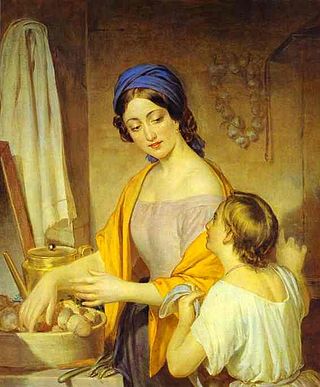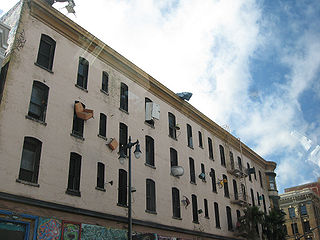
A house is a single-unit residential building. It may range in complexity from a rudimentary hut to a complex structure of wood, masonry, concrete or other material, outfitted with plumbing, electrical, and heating, ventilation, and air conditioning systems. Houses use a range of different roofing systems to keep precipitation such as rain from getting into the dwelling space. Houses generally have doors or locks to secure the dwelling space and protect its inhabitants and contents from burglars or other trespassers. Most conventional modern houses in Western cultures will contain one or more bedrooms and bathrooms, a kitchen or cooking area, and a living room. A house may have a separate dining room, or the eating area may be integrated into the kitchen or another room. Some large houses in North America have a recreation room. In traditional agriculture-oriented societies, domestic animals such as chickens or larger livestock may share part of the house with humans.

Adeline Virginia Woolf was an English writer. She is considered one of the most important modernist 20th-century authors. She pioneered the use of stream of consciousness as a narrative device.

In the history of the United Kingdom and the British Empire, the Victorian era was the reign of Queen Victoria, from 20 June 1837 until her death on 22 January 1901. Slightly different definitions are sometimes used. The era followed the Georgian era and preceded the Edwardian era, and its later half overlaps with the first part of the Belle Époque era of continental Europe.

The Great Society was a set of domestic programs in the United States launched by President Lyndon B. Johnson in 1964 and 1965. The term was first referenced during a 1964 speech by Johnson at Ohio University, then later formally presented at the University of Michigan, and came to represent his domestic agenda. The main goal was the total elimination of poverty and racial injustice.

A parlour is a reception room or public space. In medieval Christian Europe, the "outer parlour" was the room where the monks or nuns conducted business with those outside the monastery and the "inner parlour" was used for necessary conversation between resident members. In the English-speaking world of the 18th and 19th century, having a parlour room was evidence of social status.

Osborne House is a former royal residence in East Cowes, Isle of Wight, United Kingdom. The house was built between 1845 and 1851 for Queen Victoria and Prince Albert as a summer home and rural retreat. Albert designed the house in the style of an Italian Renaissance palazzo. The builder was Thomas Cubitt, the London architect and builder whose company built the main facade of Buckingham Palace for the royal couple in 1847. An earlier smaller house on the Osborne site was demolished to make way for the new and far larger house, though the original entrance portico survives as the main gateway to the walled garden.

Remote work is the practice of working from one's home or another space rather than from an office.
The Culture of Domesticity or Cult of True Womanhood[a] is a term used by historians to describe what they consider to have been a prevailing value system among the upper and middle classes during the 19th century in the United States. This value system emphasized new ideas of femininity, the woman's role within the home and the dynamics of work and family. "True women", according to this idea, were supposed to possess four cardinal virtues: piety, purity, domesticity, and submissiveness. The idea revolved around the woman being the center of the family; she was considered "the light of the home".

A home, or domicile, is a space used as a permanent or semi-permanent residence for one or more human occupants, and sometimes various companion animals. It is a fully- or semi-sheltered space and can have both interior and exterior aspects to it. Homes provide sheltered spaces, for instance rooms, where domestic activity can be performed such as sleeping, preparing food, eating and hygiene as well as providing spaces for work and leisure such as remote working, studying and playing.

An office is a space where the employees of an organization perform administrative work in order to support and realize the various goals of the organization. The word "office" may also denote a position within an organization with specific duties attached to it ; the latter is an earlier usage, as "office" originally referred to the location of one's duty. In its adjective form, the term "office" may refer to business-related tasks. In law, a company or organization has offices in any place where it has an official presence, even if that presence consists of a storage silo, for example, instead of a more traditional establishment with a desk and chair. An office is also an architectural and design phenomenon, including small offices, such as a bench in the corner of a small business or a room in someone's home, entire floors of buildings, and massive buildings dedicated entirely to one company. In modern terms, an office is usually the location where white-collar workers carry out their functions.

A housewife is a woman whose role is running or managing her family's home—housekeeping, which may include caring for her children; cleaning and maintaining the home; making, buying and/or mending clothes for the family; buying, cooking, and storing food for the family; buying goods that the family needs for everyday life; partially or solely managing the family budget—and who is not employed outside the home. The male equivalent is the househusband.

A domestic worker is a person who works within a residence and performs a variety of household services for an individual, from providing cleaning and household maintenance, or cooking, laundry and ironing, or care for children and elderly dependents, and other household errands. The term "domestic service" applies to the equivalent occupational category. In traditional English contexts, such a person was said to be "in service".

Sandringham House is a country house in the parish of Sandringham, Norfolk, England. It is one of the royal residences of Charles III, whose grandfather, George VI, and great-grandfather, George V, both died there. The house stands in a 20,000-acre (8,100 ha) estate in the Norfolk Coast Area of Outstanding Natural Beauty. The house is listed as Grade II* and the landscaped gardens, park and woodlands are on the National Register of Historic Parks and Gardens.

In ancient Rome, the domus was the type of town house occupied by the upper classes and some wealthy freedmen during the Republican and Imperial eras. It was found in almost all the major cities throughout the Roman territories. The modern English word domestic comes from Latin domesticus, which is derived from the word domus. Along with a domus in the city, many of the richest families of ancient Rome also owned a separate country house known as a villa. Many chose to live primarily, or even exclusively, in their villas; these homes were generally much grander in scale and on larger acres of land due to more space outside the walled and fortified city.

Single-room occupancy (SRO) is a type of low-cost housing typically aimed at residents with low or minimal incomes, or single adults who like a minimalist lifestyle, who rent small, furnished single rooms with a bed, chair, and sometimes a small desk. SRO units are rented out as permanent residence and/or primary residence to individuals, within a multi-tenant building where tenants share a kitchen, toilets or bathrooms. SRO units range from 7 to 13 square metres. In some instances, contemporary units may have a small refrigerator, microwave, or sink.

Women in Russia have a rich and varied history during numerous regimes throughout the centuries. Since Russian society is multicultural, the experiences of women in Russia vary significantly across ethnic, religious, and social lines. The life of an ethnic Russian woman can be dramatically different from the life of women of minority groups like the Bashkirs and the life of a woman from a lower-class rural family can be different from the life of a woman from an upper-middle-class urban family. Nevertheless, a common historical and political context provides a framework for speaking about women in Russia in general.
Household goods are goods and products used within households. They are the tangible and movable personal property placed in the rooms of a house, such as a bed or refrigerator.

The study of the impact of globalization on women in China examines the role and status of Chinese women relative to the political and cultural changes that have taken place in the 20th century as a consequence of globalization. Globalization refers to the interaction and integration of people, products, cultures and governments between various nations around the globe; this is fostered by trade, investment, and information technology. Globalization affected women's rights and the gender hierarchy in China, in aspects of domestic life such as marriage and primogeniture, as well as in the workplace. These changes altered the quality of life and the availability of opportunities to women at different junctures throughout the modern globalization process.

Terraced houses have been popular in the United Kingdom, particularly England and Wales, since the 17th century. They were originally built as desirable properties, such as the townhouses for the nobility around Regent's Park in central London, and the Georgian architecture that defines the World Heritage Site of Bath.

Reproductive labor or work is often associated with care giving and domestic housework roles including cleaning, cooking, child care, and the unpaid domestic labor force. The term has taken on a role in feminist philosophy and discourse as a way of calling attention to how women in particular are assigned to the domestic sphere, where the labor is reproductive and thus uncompensated and unrecognized in a capitalist system. These theories have evolved as a parallel of histories focusing on the entrance of women into the labor force in the 1970s, providing an intersectionalist approach that recognizes that women have been a part of the labor force since before their incorporation into mainstream industry if reproductive labor is considered.


















